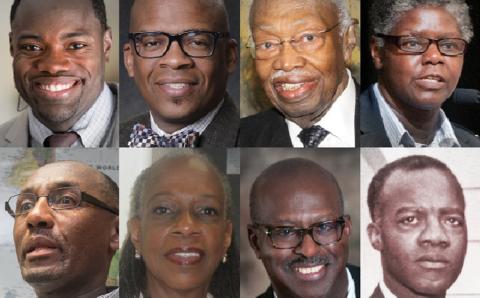It’s not hard to see that the loss of engaged young adults in local churches is a worrying trend—just listen in on church members’ conversations (August 2007), read results of national surveys, or take a look at demographic study results. A possible response is fostering connection between younger and older members. In some Christian Reformed church communities across the U.S. and Canada, members are finding genuine, reciprocal, intergenerational relationship through shared work and mission experiences.
Jim Beezhold, an 81-year old cross-country Sea-to-Sea cyclist who attends Crossroads CRC in San Marcos, Calif., experienced that this summer. Beezhold has adopted the phrase “Aspire to inspire before you expire,” a quote he found on the sign at Calvin CRC in Ottawa during one of the legs of his cross-country trip. Despite the 60 or more years between them, Beezhold found himself connecting instantly and deeply with the young adults on the ride, four of whom were still teenagers. Beezhold attributes this to their assistance to him as the “grandfather figure.” The younger riders would often slow down to provide encouragement, share music from the 50s and 60s, or help Beezhold operate his cellphone. In turn, Beezhold and the other older cyclists supported the team spiritually. Through the daily cycling grind, camping together each night, and the overall shared experience, the entire team formed a special bond, regardless of age or background.
In the less physically intense but equally friendly environment of Maple Ridge, B.C., a volunteer-operated shop called Mission Thrift Store is another setting for cross-generational connections. Started by a group from Maple Ridge CRC and with almost half its volunteer staff still belonging to the denomination, the shop resells donated items to aid the Bible League of Canada. While the majority of the volunteers are seniors, Janet Melissen, long-time volunteer and current chair of the board, said young people refresh the space with energy, new thoughts, and focus, playing a crucial role in keeping the mission going. In turn, the seniors enjoy the young adults’ company. The older generation loves the chance not only to talk to someone new but also to nurture the youth. The amount of time spent on a common task leads to a regular sharing of stories, which enhances the connection between the generations. While it can prove challenging to find younger volunteers during the busy school year, the store has set up a summer job program in which a university student is hired full-time for the summer. This usually ensures that the store has a young person for at least part of the year, greatly assisting both the store and student. Three of five past summer students have stayed in touch with the store, either as shoppers or occasional volunteers, proving these intergenerational friendships to be true and meaningful.
If having intergenerational friendships benefits people so greatly, why doesn’t it come more naturally to the church? Lesli van Milligen, a regional catalyzer with the CRC’s Faith Formation Ministries (FFM), attributes fear as the biggest stumbling block to a healthy intergenerational set-up. Seniors are afraid that youth will shut them down with statements such as “We don’t do that anymore.” Equally, young adults fear judgment from the older generation.
FFM has addressed some of these concerns in its 2017 Intergenerational Church Toolkit, a resource for Christian Reformed congregations. Karen Deboer, who worked on the resource, was happily surprised to find that cross-generation relationships “are built into our denominational DNA.” But for some churches, intentionally building intergenerational friendships is still a new concept.
Van Milligen said that up until a generation ago, such relationships developed organically. Now, the recent prevalence of age-segregated ministries has drastically displaced the shape of church relationships. In response, FFM researchers gathered tested ideas from multiple Christian Reformed congregations and compiled a toolkit.
Without this focus, when the church rejects a multigenerational set-up, Deboer believes that three things take over: assumptions, lack of awareness, and an inability to communicate—none of which promote church health.
Van Milligen emphasized, however, that the toolkit is not a curriculum or meant to be “one size fits all.” Rather, it is a collection of stories and examples of real-life people. “‘Intergenerational is not something churches do—it’s something they become’,” reads FFM’s user guide to the tool kit—a quote from an article by Brad Griffin of Fuller Youth Institute.
In the experience of Beezhold and Melissen, being intergenerational is far more than a stifling piece of curriculum or difficult advice. Rather, it is a relational practice that any church may adopt if they call each generation equally to work together towards a common goal, the living out of God’s kingdom.
About the Author
Elizabeth Drummond is a freelance news correspondent for The Banner. She lives in West Vancouver, B.C.








